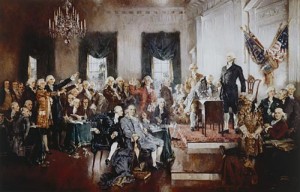In the coming months -- with a new fight over the federal budget, the Supreme Court's review of health-care reform and the November elections -- the battle in the United States will pit not just political parties and economic ideologies against one another -- but competing national narratives of how and why the United States was founded.
Indeed, it is that conflict over the American narrative that may well determine the outcome of the presidential election and the future direction of the United States. Yet, this dispute over the Founders' vision is rarely debated in the mainstream news media.
The argument does, however, inspire right-wing groups which obsess over "strict construction" of the Constitution and the "originalist" intent of the Founders. Such references also have become standard fare on the Republican campaign trail with the four remaining major candidates claiming to be in this fight to defend American "liberty."
On Saturday, for instance, ex-Sen. Rick Santorum declared that President Barack Obama's health-care reform is "a threat to the very essence of who America is." As the New York Times noted, "numbers like 1776 and 1860 increasingly pepper his speeches as he stresses the historical urgency of his candidacy."
The Right's historical narrative holds that the Founders designed the United States to have a weak central government barred from confronting most domestic problems (though with broad powers for defense). Under this "free-market" system, wealthy business interests had the "liberty" to set their own rules and the average citizen had the "freedom" to make his way the best he could.
There is, of course, a counter-narrative, but Democrats and progressives rarely make it, preferring to cede the history to the Right and to argue that the Founders couldn't possibly have anticipated the complex problems of the modern age.
Still, the counter-narrative to the GOP mythology is grounded in solid history. Indeed, the evidence is that most constitutional framers were pragmatic men interested in building a strong nation. They also were fed up with the weak central government under the Articles of Confederation. They surely weren't anti-government ideologues.
In the Constitution, they created a robust central authority, stating in the preamble the explicit responsibility of the government "to promote the general Welfare." The document also granted the federal government broad domestic powers, including authority to regulate interstate commerce, the so-called Commerce Clause.
Framing the Commerce Clause
Plus, the Commerce Clause was not some afterthought at the Constitutional Convention in 1787. It was presented as one of the new federal powers in James Madison's Virginia plan on the first day of substantive debate. It also was considered one of the least controversial features of the new governing framework.
Indeed, constitutional architect Madison had been maneuvering to give this power to the federal government for years, seeking such a change in the Articles of Confederation, which governed the United States from 1777 to 1787.
Madison "sponsored a resolution instructing Virginia congressmen to vote to give the federal government the authority to regulate commerce for twenty-five years," noted Chris DeRose in Founding Rivals, a resolution that won the support of Gen. George Washington, one of the fiercest critics of the weak central government in the Articles of Confederation.
Because the Articles' structure of 13 "independent" and "sovereign" states had left Washington's soldiers starving and desperate -- when the states reneged on promised funding -- Washington advocated a much stronger central government.
Regarding Madison's commerce idea, Washington wrote that...
"the proposition in my opinion is so self evident that I confess I am at a loss to discover wherein lies the weight of the objection to the measure. We are either a united people, or we are not. If the former, let us, in all matters of a general concern act as a nation, which have national objects to promote, and a national character to support. If we are not, let us no longer act a farce by pretending it to be."
When the Virginia legislature slashed Madison's proposal for federal control of commerce from 25 years to 13 years, he voted against it as insufficient. His thoughts then turned to a more drastic scheme for consolidating power in the hands of the federal government, a constitutional convention, albeit under the guise of simply proposing some changes to the Articles.
A Dramatic Change
(Note: You can view every article as one long page if you sign up as an Advocate Member, or higher).






